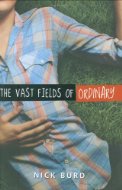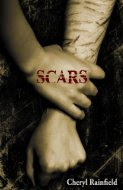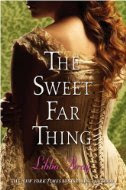Tween Tuesday was started over at
Green Bean Teen Queen as away to highlight awesome books for the 9-12 yr olds or Tweens. Any book highlighted on Tween Tuesday also counts for the In the Middle Reading Challenge! This week's book is:
Snyder, Laurel. Penny Dreadful. Drawings by Abigail Halpin. New York: Random House, 2010. Print.
[Book cover credit: librarything.com/work/9761350]
Booktalk:
After spending most of her life living in a mansion with a tutor and a chef and "approved" friends with impeccable manners and hardly any personality, Penelope wishes, at the wishing well in her backyard of course, for something, anything interesting to happen to her. But interesting is not always as fun as it looks in the books Penelope spends her days reading. When her dad quits his job and her family runs out of money, Penelope quickly makes another, more specific wish. Instead of wishing for anything, she wishes for something to fix the multitude of problems left behind by all the "interesting" going on in her life and suddenly finds herself moving to Thrush Junction in the country, which for Penelope, might as well be a whole new world.
Review:
This is a hard book to summarize because the beginning is so incredibly different from the rest of the book. It all goes together. The difference doesn't cause any jarring shifts for the reader, and circumstances in the opening make the rest of the book make sense, but this is not a book about a little rich girl who moves to the county, as the first couple chapters would have you believe. Yes, Penelope has grown up rich, but finances quickly deteriorate in the Grey household after her father leaves his job. As the whole family figures out how to live without a chef, a housekeeper, or even a steady income, this becomes a book about figuring out what is really important. Houses and furniture can be let go; your family (and your books!) you take with you. Once that family gets to Thrush Junction, however, this becomes a book about finding yourself, making friends, and feeling and helping others to feel welcome. It's about community.
But I didn't think any of this while I was reading. While reading
Penny Dreadful, this was just a book about Penelope, who wanted to go out and experience life. She needed to become Penny instead, and in Thrush Junction, she finds just the right people to help her do just that.
Thrush Junction is populated with a bunch of oddballs, many of whom live at Whippoorwillows with the Greys. Penelope, who has never really had friends before, must come out of her shell, and Luella is the perfect girl to drag her out. As Penelope, now Penny, learns how to have and be a friend, Luella introduces her to the rest of their little town. There's Down-Betty who was in vaudeville, Duncan who might be allergic to EVERYTHING and so is barely allowed to eat anything, Kay who runs the town diner, Jasper who is Luella's
other best friend, Twent who can't say his r's (and has two moms!), and a whole bunch of other folks. The whole thing reminded me of
Because of Winn-Dixie, but with a buried treasure legend instead of a dog. It has a feel-good feeling throughout that is infectious, even though the Greys money worries are a constant hum in the background. Things can be a bit episodic, but that's because that's how summer is sometimes. It's all about the people that come and go and the fun things that you get to do together for one day.
It's great to see so much diversity in the characters. In addition to Twent's two moms, Luella and her family are black, there is a wide range of ages at Whippoorwillows (and not all the old folks are grandparents), non-traditional gender roles within otherwise traditional family units, and a character who is deaf (can't tell you which without a spoiler). And there are no big deals made about any of it. These are all simply people that Penny meets during her adventures in her new town, and it's great to see them represented in literature just because they exist in real life rather than to Teach a Lesson to readers about how Everyone's the Same on the Inside!
I should also add that
Penny Dreadful is also peppered with drawings by Abigail Halpin. Rather than distracting from the text, as I often think in-text illustrations do in chapter books, they add to it. My ARC only has preliminary sketches, but from those, I can tell that they're going to be awesomely full of life and emotion. My favorite one is of Penny is straggling behind Luella and Jasper on the sidewalk with the most sour look on her face ever, though the drawing of Twent "wahwing" is a close second. :)
Penny Dreadful comes out in hardback today!
Book source: ARC picked up at ALA.



















